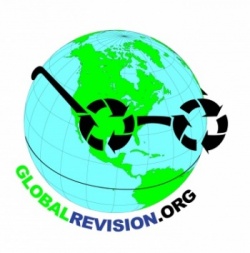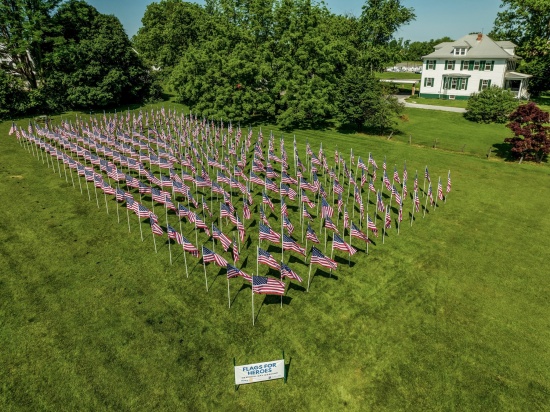
The GLOBAL re-VISION Network by Bob Martin
Major funding provided by Rockville Rotary Foundation
I had two experiences in 2001 and 2002, that dramatically improved the lives of a couple hundred thousand people – thus far – and were the reason I joined Rockville Rotary.
Late in 2001, a retired doctor I didn’t know called and asked if I was involved with the Tree-Land Foundation, Inc., a non-profit I’d co-founded. I told him I was. He asked if I wanted to salvage several thousand used eyeglasses in deteriorating boxes from a barn that was going to be bulldozed on a farm he’d sold. Could I do something with them? I figured I might find a Lions Club to take them, so I went, bagged them up and took them away. Later, some high school student volunteers helped me box-up some of them.
In 2002, I learned of a clinic in Mexico City that accepted donations of used eyeglasses. I called the guy who headed the clinic to ask if he wanted mine, and he did. He asked if I wanted to visit and see what they do with used glasses. I said I would, and I arranged a visit for early November.
I visited the Rotary-sponsored Mexico City clinic with its co-creator Frank Devlyn in his chauffeur-driven, bullet-proof, black Suburban. I learned that Frank and his two brothers owned a company called Devlyn Optical with more than 600 retail eyeglasses stores and over 1000 employees throughout Mexico and Central America. From 2000 to 2001, Frank had been the President of Rotary International, an organization about which I knew very little.
Being unfamiliar with the clinic’s operation, Frank told me to remove my glasses and sit in front of a machine called an autorefractor (an electronic device that instantly can determine a person’s vision prescription). In seconds, the machine produced a small paper receipt. Frank typed the numerical information from it (my vision prescription) into a computer. He scrutinized the monitor, jotted something onto a slip of paper and walked over to a large shelved area holding many hundreds of cardboard boxes. He selected a box, pulled out a pair of glasses out of it and said: “Put these on.”
“Look through that window. Are things clear on the other side of the street?” They were! He handed me a brochure and asked: “Can you read this?” I could!
“These are used bifocals, and they’re my prescription, aren’t they? How’d you do that?” I asked.
Frank told me they had a special computer program that databased used eyeglasses by their prescriptions and then matched the patient’s vision prescription to the best available pair of glasses in the clinic’s inventory. The whole process took only a few minutes per patient. Recognizing the speed and accuracy of the technology over any other approach to dispensing recycled glasses I asked. “Where else is this being used?” I was told it was not being used anywhere else.
I told Frank that if he was agreeable, instead of donating my glasses to him, I wanted to use my glasses and his computer program to start a similar clinic in the Mexican state of Yucatan – where I’d visited dozens of times – to help my indigenous Maya friends there. He agreed.
During the next 5 years I:
- Joined the Rotary Club of Rockville, Maryland and a Lions Club in Frederick County
- Started the GLOBAL re-VISION Network (with my non-profit) to create a new vision clinic
- Collected nearly 100,000 used eyeglasses through Lions Clubs
- Worked with SUCCESS Program students weekly sorting, counting and boxing donated glasses
(SUCCESS is a 3-year job and life skills training program for very learning disabled 18-21-year old students sponsored by Frederick County (Maryland) Public Schools)
- Arranged low-no cost warehousing and transporting of glasses with Bowman Trucking Company
- Spent many weeks in various parts of Mexico working with the creator of the clinic computer program, working in vision clinics, learning the “system”
- Contracted with Mexican Custom Broker to handle importing, documents, containerizing and shipping from U.S. to Mexico (at no charge)
- Wrote grants, acquired funding from Rockville Rotary Foundation, Delaplaine Foundation, Tree-Land Foundation, several individuals, and others
(All of these organizations and individuals have continued helping, and we have raised in total more than $100,000 toward our efforts)
- Negotiated collaboration with Mexico’s Yucatan state government’s DIF Yucatan (their health and social services agency) to sponsor, and operate a vision clinic in their capital city Merida to dispense free eyeglasses to underserved people
- Purchased computers, electronic diagnostic equipment, set-up clinic, trained clinic technicians
- Opened the Clinic of Visual Health on February 1, 2007
- Have continued working with SUCCESS students (19 years in 2020) collecting, boxing and supplying glasses to clinics (approx. 700,000 by 2020)
- Since 2007, have established 9 additional clinics using our unique technology
(At Bascom-Palmer Eye Institute in Florida, B-P’s “Mission” clinic in Haiti, a mobile clinic in Yucatan, 3 clinics at LAC+USC Hospitals in Los Angeles, 3 clinics in collaboration with 4 Mexican Rotary Clubs and DIF Quintana Roo in Cancun, Playa del Carmen, and Chetumal in the state of Quintana Roo, Mexico)
WHY DOES THIS MATTER?
- Globally, almost 6 BILLION people have vision problems (refractive errors) and need eyeglasses
- 2½ to 3 BILLION people cannot afford or acquire eyeglasses to correct their bad eyesight
- Refractive error/bad eyesight is a global health epidemic and the world’s № 1 learning disability, cause of illiteracy, blindness, and poverty.
- The overlooked easiest, single most significant way to overcome the above issues is by putting eyeglasses onto the faces of people in need and correcting their refractive error.
- In the United States alone, there are between ONE AND TWO BILLION “retired,” spare used eyeglasses available for donation and recycling IF the need was better known and there was a will to collect them.
NOTE:
Most programs, campaigns and discussions of vision issues emphasize overcoming “Blindness.” Blindness (legal blindness and/or total blindness) is the most extreme vision disability and not to be minimized. However, the total percentage of vision impaired people who are legally and/or totally blind amounts to just 4/10ths of 1% of everyone with vision problems.
Refractive errors afflict about 75% of humankind, nearly 6 BILLION people, and glasses are the simple “cure!”


